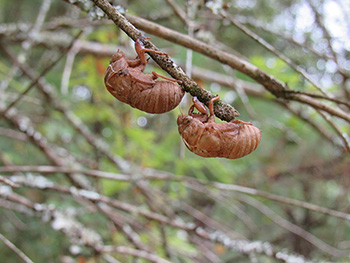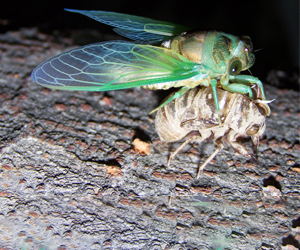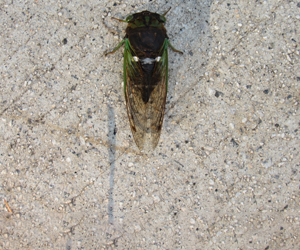Cicada! Bet You Can't See Me: Heard but Seldom Seen
Cicada! Bet You Can't See Me: Heard but Seldom Seen
By Bill Willis and Bill Steinmetz

(Photo courtesy of Bill Willis)
August 21, 2018
- Cicadas are more often heard than seen
- Cicadas are seldom an economic importance to individual property owners
- Cicadas live underground from one to seventeen years where they feed on the sap of roots
- They are not beetles like Japanese or May Beetle grubs
In North America, 190 species of cicada have been reported. The most common cicada, according to Cicada Mania, is the Magicicada periodical cicadas, aka "locust", has an amazingly long 13 or 17 year existence underground.

(Photo courtesy of Flickr)
Adults hang out in trees, feed on plant sap, vocalize, socialize, mate, and repeat the “circle of life.”
Birds and a short adult life span are the cicada’s nemesis.
The male cicadas sing with different sounds for different purposes: distress, chorus, courting, or call. They must start singing immediately for they only live a month as adults. Pick one up and it will make one of its distress sounds.
Females lay a rice-like egg in a groove they cut into a branch. The larva will hatch there and feed on the tree sap until the branch dies. They then fall to the ground, dig in and begin to feed on plant roots. They will suck sap from roots for 2 to 17 years. After that time, they emerge as nymphs, climb a tree or vertical structure where they shed their exoskeleton (outer skin) to begin their winged life.

(Photo courtesy of Bill Willis)
Cicadas are not the grubs of beetles that some homeowners associate with lawn damage. Nor are these true “Locust” or grasshoppers. Even though cicadas can emerge in great numbers and swarm; they are not related to grasshoppers that can defoliate crops over large areas. Cicada are more interested in mating than eating. They can be noisy at times particularly as adults.
Observers have been known to travel around the country just to document emergence since the timing can be charted. It’s now August 15th and the cicadas are present on campus and serenading.



